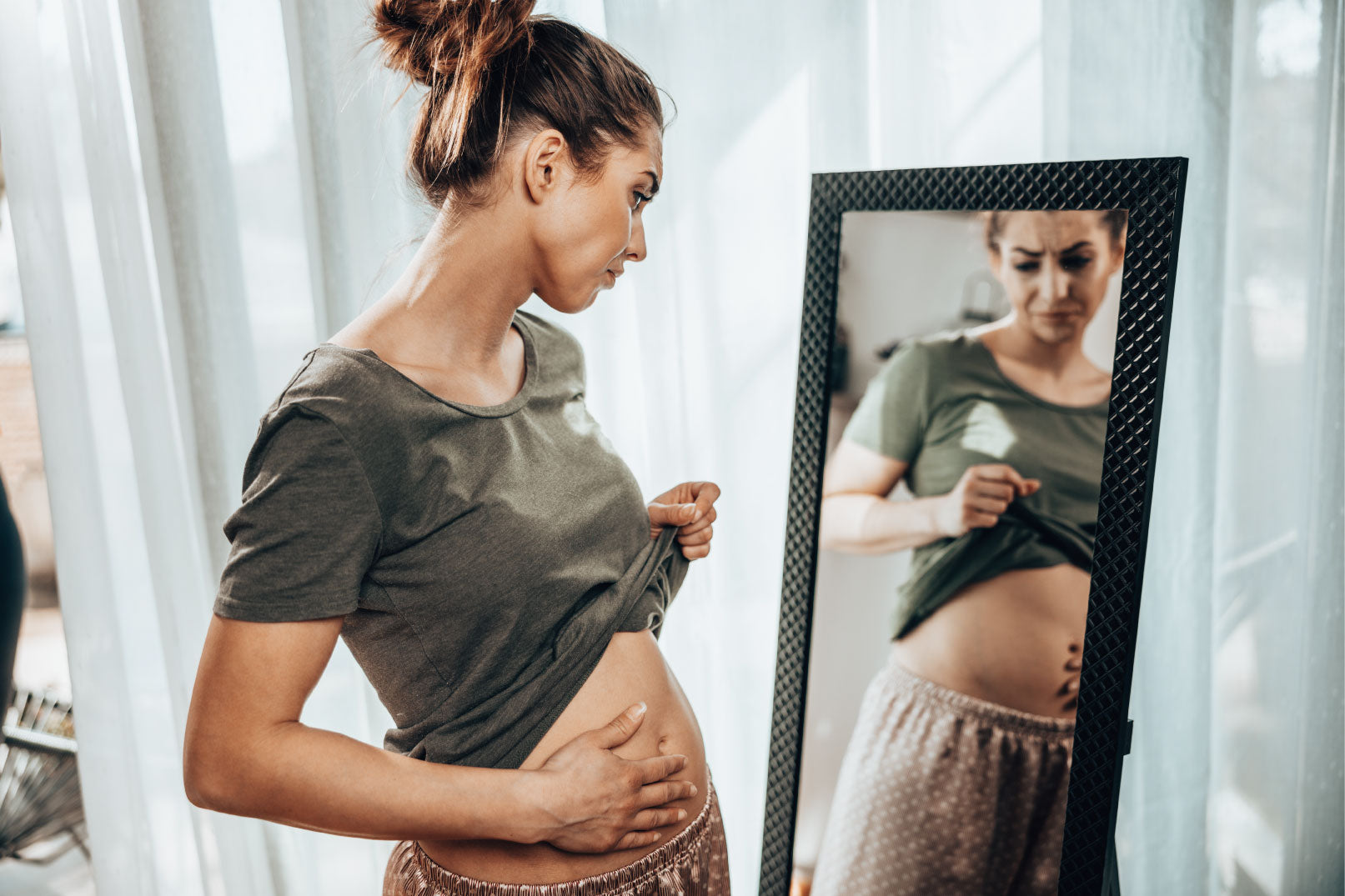Do You Gain Weight On Your Period? Here's Why.

You have probably heard that some women gain weight on their periods. It's not a myth, it's true. But how does this happen, and why does it happen to only some women, not all?
Here's what you need to know about period weight gain, the causes, how to prevent it, and how it affects your body throughout your cycle.
Is it normal to gain weight on your period?
It is normal to gain weight on your period. Many women, especially those who are not used to having their periods or those who have just started having them, are worried they will gain weight. We’ve included some causes below to help you feel less concerned about weight gain on your period.
Why do you gain weight on your period?
Hormones & oestrogen production
Hormone fluctuations don’t only cause changes in discharge, they are also one of the most common causes of weight gain during your period. This is because changes in hormone levels can cause fluid retention and bloating in some women.
For example, right before your period, the female sex hormone (oestrogen) peaks, says Mary Jane Minkin MD, a clinical professor of obstetrics, gynaecology, and reproductive sciences at the Yale School of Medicine. These higher levels of oestrogen can then make you feel bloated, and cause you to gain a few pounds of water weight.
Blood sugar levels
The effect your period has on your blood sugar levels can change month-on-month; it may cause a drop or rise in blood sugar levels. In response, you may also experience an increase in appetite before your period. Avoiding sugary foods or refined carbohydrates (such as white bread) and sticking to your regular diet can help avoid unwanted weight gain. This is because these foods raise your blood glucose levels, which can cause you to be hungrier.
If you’re on the contraceptive pill, aside from the pill impacting the period itself, it’s not considered associated with period weight gain. However, hormonal contraception can impact your sugar levels, making you crave more foods.
Water retention
Most weight gain during a period is down to water retention, says Lauren Streicher, MD, a clinical professor of obstetrics and gynaecology, and the medical director of the Center for Sexual Medicine and Menopause at Northwestern Memorial Hospital. “You retain a lot of fluid when your period comes, and then the weight goes away afterwards," she says. This can lead to uncomfortable bloating before and during periods, often described as feeling sore and swollen.
Health conditions like PCOS
If you have PCOS (polycystic ovarian syndrome), a hormone imbalance may cause insulin resistance and high levels of insulin in the body--which makes it difficult for fat cells to burn energy as fuel instead of storing it as fat tissue. This results in weight gain.
Lifestyle Choices
Sometimes it's just plain old overeating at work here, but why are you so hungry on your period? When menstruating, the increase in progesterone levels can cause an increase in food cravings or PMS symptoms like irritability or depression that make us feel hungry and reach for comfort foods like chocolate cake or ice cream. If you're trying to control bloating or weight gain, make sure you stay hydrated. When sugar cravings strike, go for fruits instead, as they have natural sugars.
Also, concern about putting on weight may mean that some women might stop eating during their menstrual cycle. This can cause other problems, such as low energy levels and headaches. Low energy can also make you less motivated to exercise, which can impact your sleep. This all then feeds into weight gain.
Stress
If you are stressed, this can impact your cycle, and result in your period being late. It can also lead to stress-related weight gain. This is because it interferes with cognitive processes related to self-regulation, as well as increasing levels of hormones and chemicals involved in hunger, causing you to overindulge in foods. It can also disrupt your sleep, which can cause weight gain in and of itself. Also, it can reduce your energy, making you less motivated to exercise.
Average weight gain during your period
The amount of weight you gain on your period varies from person to person. Some women gain as much as five pounds, while others only gain two or three pounds. The main cause is water retention, which is especially common in women who exercise regularly.
It's not unusual for weight gain to vary between different women and cycles, says Charis Chambers, MD, a gynaecologist in Houston, US. "An average adult has weight fluctuations of up to five pounds in a single day, so it is safe to say that weight changes within that range are normal," Dr. Chambers says.
If you're worried about weight gain, try to eat healthy foods and avoid junk food as much as possible. This will help keep your weight down and keep you feeling good throughout the rest of your cycle!
When does period weight gain start?
Weight gain on your period is temporary and goes away after your period ends. It will usually show up in the week leading up to your period, during your period, or just after your period.
Before period weight gain
You may gain weight around your period; about 5 days before your period even begins. This can happen if you're eating more than usual and not exercising as much, which leads to water retention, bloating and swelling in the body.
Weight gain during menstruation
Menstruation is the point at which you will weigh the most during your cycle. Some women experience a drop in their metabolism during their cycle, because of hormonal changes that affect how the body uses energy (calories). This means that even if you're eating less than normal during this time, it's possible to still put on temporary weight from excess fluid retention. You may also have the sensation that you’ve gained weight through bloating caused by PMS symptoms, such as cramps.
After period weight gain
The good news is that when your period ends, so does an increase in calorie burn. This means that most likely any weight gained during your period should come off again after bleeding stops completely.
When does the weight gained on your period go away?
Weight gain on your period is temporary, but it can take some time to go away. Weight gain on your period is caused by water retention, so once your body flushes out the extra fluid, you'll be back to normal.
If you're only gaining a few pounds and they're going away after your period ends, then there's no need to stress about it! It's likely just water weight.
Is there anything I can do to prevent period weight gain?
There is no way to entirely prevent the natural temporary weight-related side effects of menstruation. That being said, there are ways you can reduce the likelihood of putting on additional weight that carries on past your period, such as:
Reduce stress levels
There are many ways of practising mindfulness, but one simple method involves focusing on all the sensations in your body at any moment — and then letting them go when they pass away. This practice can help reduce stress overall, which may also reduce bloating caused by PMS or menstrual cramps, and keep hunger pangs at bay!
Eat well
You should be eating healthy, balanced meals throughout your cycle. But if you're concerned about gaining weight during your period, it's especially important to make sure you're getting enough fibre and fluids to avoid constipation. Avoiding salty foods and caffeine is also a great idea if you're feeling bloated during your period.
Exercise
Do some more exercise to reduce water retention. Water weight makes up most of the additional pounds on your body during your period. If you're exercising regularly and eating well, but still notice an increase in weight during this time of the month, try doing more physical activity. You could even practise yoga to boost your mood!
Stay hydrated
You can do a few things to reduce your water retention, which is what causes most of the period bloating. First and foremost, make sure you're drinking enough water during this time. Drinking plenty of extra water will help flush out excess salt from your system and keep your body hydrated throughout the day.
Stay comfortable
If you're feeling bloated during your period, the best thing you can do is stay comfortable. Wearing comfortable and breathable period protection like our period underwear will allow you to feel confident, knowing that you're leak free and protected during the day. Our new One Size period pants stretch with your body, with one pair covering four sizes, making them the perfect pants for bloating. Why not give them a try?
So there you have it — yes, your period can make you gain weight, but there are some things that you can do to take control back. We hope this article has helped you understand why you may gain weight during your period. Ask any questions or share your own experience with period bloating or gaining weight on your period in the comments below. As always, if you're concerned, speak to your doctor!
You can shop our range of period pants to help you navigate cramps and bloating in comfort and confidence!
Period Weight Gain FAQs
Can you eat more on your period without gaining weight; is it okay?
Yes, you can eat more on your period without gaining weight. But it's important to be careful not to overindulge. You should also consider regular exercise to get your body moving and your mind feeling good.
How much is too much? It depends on your body type and metabolism. If you are naturally thin and have a fast metabolism, then eating more than usual might not cause any extra weight gain at all. But if you're already overweight or have a slower metabolism, eating even just a little bit more than usual could lead to faster weight gain.
Is period weight gain noticeable?
Bloating can be noticeable. However, this is not true weight gain and will dissipate after your period. Your weight naturally fluctuates throughout your cycle, so it’s important not to be hard on yourself.
Should you weigh yourself on or after your period?
Due to you losing any temporary weight gain in the week following your period, it’s advised you should not weigh yourself during or right after your period. This will prevent any confusion and anxiety the figure on the scales may cause.
Is it harder to lose weight on your period?
No, as the menstrual cycle doesn’t seem to affect your ability to lose weight, and weight gain due to bloating and water retention is temporary, and will go away in the week following your period. However, a lack of energy and motivation can also make you feel less motivated to exercise, for example, so you may find it harder to lose weight psychologically.
- Tags: Myths & Facts Periods



